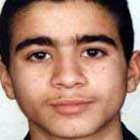One evening in March 2003, Omar was taken from his cell and in no mood to co-operate. The guards left him in the interrogation booth for hours, short-shackled with his ankles and wrists bound together and secured to a bolt on the floor. Unable to move, he eventually urinated and was left in a pool of urine on the floor.
When the MPs returned and found the soiled teenager, Omar's lawyers later said, the guards poured pine oil cleaner on his chest and the floor. Keeping him short-shackled, the guards used Omar as a human mop to clean up the mess. Omar was returned to his cell and for two days the guards refused to give him fresh clothes.
He was threatened with rape and extradition to Egypt, which allows torture. (Rolling Stone published this long feature article with more details on his torture.) Omar turned 16 a month before arriving at Gitmo. Under Pentagon policy, he was treated as an adult from his first day there.
The United Nations has warned the U.S. that it has a duty to protect Khadr as a "child soldier," and work to rehabilitate rather than prosecute him.
Omar's family is al-Qaeda. His father forced him to fight against the Taliban in Afghanistan. See my earlier post, Child of Jihad and An Unprivileged Belligerant. The CBC has a family album here.
Omar's Egyptian-born father Ahmed Said Khadr was an Osama bin Laden confidante and suspected financier who shuffled his family around Canada, Pakistan and Afghanistan. A self-described "Al Qaeda family," they nursed hatred for Americans, cheered 9/11, trained their sons in Al Qaeda camps, and urged them to become martyrs.
As Jeanne D'Arc of the (unfortunately now defunct) blog Body and Soul wrote back in 2002:
When he was captured in Afghanistan, he was fifteen -- a child turned into a soldier by parents from hell. And our government's response to this victim of child abuse was to abuse him further.
What should the U.S. have done? Human Rights Watch provides the answer.




